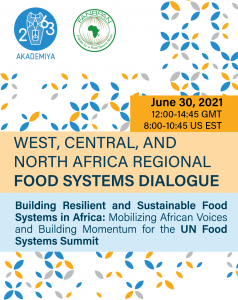الملاحظات التقييمية الرسمية على الحوارات إلى قمة الأمم المتحدة للنظم الغذائية لعام 2021
نوع الحوار
بدعوة من
لغة فعالية الحوار
التاريخ/الوقت
إلى:
المدينة
نطاق التركيز الجغرافي
التنسيق
يُرجى مراجعة التفاصيل أدناه للحصول على معلومات التسجيل إذا كانت متوفرة أو الاتصال بمنظم الحوار إذا كنت ترغب في الحضور.
الوصف
Despite progress made over the past few decades, about 767 million people globally continue to live in extreme poverty, half of them in Africa (FAO, 2018). The majority of Africa’s poor and hungry live in rural areas and depend on agriculture for their livelihood. However, their livelihoods are often constrained by limited access to resources, services, technologies, markets, and economic opportunities, lowering their productivity and income. Rapid population growth, youth unemployment, conflict, civil unrest, climate change, and environmental degradation exacerbate the situation.
In addition, the COVID-19 pandemic has further threatened Africa’s food systems and the livelihoods of the most vulnerable. As a result of the COVID-19 pandemic, market supply chain and trade disruptions have reduced food accessibility, especially in areas that are already substantially affected by food insecurity (Cullen, 2020). Furthermore, some countries have seen an increase in food prices and global models predict that the number of people living in poverty could substantially increase— exacerbating poverty and hunger in developing countries (Vos et al, 2020)
Through the African Union’s Agenda 2063, the 2014 Malabo Declaration, and the UN SDGs, African leaders have resolved to transform food systems on the continent including ending hunger and improving food security and nutrition for all. Nevetherless, the Second Biennial Report reveals that Africa is not on track to achieve the Malabo Declaration’s commitment on ending hunger by 2025 (AUC, 2020). In fact, the number of undernourished people in Africa rose from 184 million to 206 million between 2015 and 2017 (ReSAKSS, 2020). The increasing trend is closely associated with the increase in civil unrest in the Africa, exacerbated by climate-related shocks, recurring pest infestations, and other stresses that threaten agricultural productivity and food security of the most vulnerable populations. Ensuring that Africa has sustainable and resilient food systems requires a multi-pronged approach and multi-sectoral concerted efforts that seek to address in a holistic manner the closely interlinked objectives of poverty reduction, ending hunger, food and nutrition security, and ensuring resilience of livelihoods and production systems.
It is against this background that AKADEMIYA2063 and the Food, Agriculture and Natural Resources Policy Analysis Network (FANRPAN) are convening a Regional Food Systems Dialogue for West, Central and North Africa under the Independent Dialogues Food Systems Summit banner. The overall goal is to enhance regional advocacy in support of the Food Systems Summit engagement process specifically focusing on Action Track 5: Build resilience to vulnerabilities, shocks, and stress.
The resilience of food systems needs to be strengthened in such a way that the economic, social and environmental foundations to produce sufficient nutritious food are not compromised for future generations. It demands a comprehensive approach that integrates responses to climate, biodiversity, loss, conflict, pandemics, economic crises, food insecurity, malnutrition and considering poverty, inequalities and poor land use and distribution as structural root causes of increased hunger.
Register for dialogue here: https://bit.ly/3hNPawJ
الشكر والتقدير


